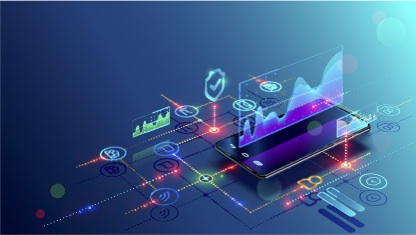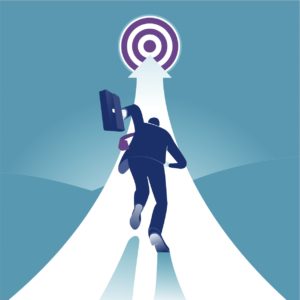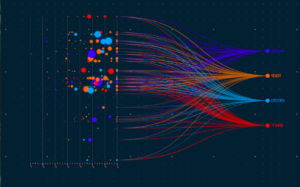Data visualization is an extremely powerful manner to generate business insights and arrive at better, data-driven decisions. The way in which visualizations are created has evolved over time — from the simple and static charts of the past to interactive, engaging visuals today. What are the current trends in data visualization that give us a peek into what future visualizations will be like? We look at the top 7 trends in data visualization that will become more widespread in the future.
- Keeping the user at the center of data visualization design
Traditional user interface and data visualization choices available from analytics platforms — such as reports, charts, and dashboards — work well for certain applications, but they expect the user to adhere to the platform, instead of making the platform work for the user. In traditional user interfaces, the approach was often “more data equals more value”, meaning that if you aren’t sure what data users will need to achieve their goals then you risk serving them too much information to cover all scenarios. This results in too many static dashboards, filters, charts, and numbers that don’t add value and can leave users confused. What’s needed instead are visualizations that are personalized to the specific needs of each user.
User-centered design (UCD) is an important trend that puts the user first, followed by context and then data. Irrespective of the industry, UCD follows the same thought process, starting with thinking about users and their specific pain points. What problems are users trying to solve and what possible obstacles are they facing? What information and functionality do they need to solve that problem? And how can we visualize that for them in the best possible way? Users want a simple, straightforward user experience that delivers the information they need with the least possible complexities so that the next steps are suggested and they can focus on more strategic and valuable work.
One of the newest user experience and data visualization trends is to merge users’ workflows with actionable insights, suggestions, predictions, and the best subsequent actions for the task or decision at hand. Savvy business users can drill further into the data and discover patterns, trends, and correlations, without being burdened with the complex toolsets used by dedicated business analysts. - Data visualization is becoming more social
Data visualization is becoming increasingly social and is often shared on various social media platforms these days, where it engages many followers and viewers. Data scientists have also recognized this trend and are now more focused on making visualizations social media-friendly, designed to better engage followers on social media.
As the attention span of social media users is quite short, data must be presentable, visually attractive, concise and to the point. Data visualization for social media sharing follows the “less is more” philosophy. A few examples of social media visualizations include 3D animations, GIFs, and content and data visualizations in the form of videos for popular video-sharing apps.
Dashboards used in internal data visualization software often deliver real-time data which is used for effective collaborative efforts and decision-making for team members using the software. They also possess multi-functioning widgets, sparklines, and trend indicators to assist the team in understanding data visualizations, as well as a user-to-user messaging capability that supports effective communication between different users. Today the best data visualization software have features where they can link, graph, and share data from desktop computers to mobile devices too. Entire dashboards can be shared with team members and be analyzed either through desktop computers, laptops, and mobile devices such as smartphones and tablets as well. These social and sharing features are extremely helpful factors for the successful relay of information between team members within an organization. - Data will get more and more democratized
Another interesting trend is data democratization which means that anybody can use data at any time to make decisions, without any boundaries to access. Data visualization tools play a significant role in democratizing data and analytics and making data-driven insights accessible to all users throughout an organization. It empowers the users to access and visualize data and build interactive personalized dashboards with a few clicks. This helps to identify new business opportunities and solutions to challenges, and draws on ideas and innovations across the entire organization. - We will be looking for the stories that data reveal
When people hear stories, they often feel emotionally engaged and tend to remember them better than they can recall dry facts. Data and numbers do have important stories to tell, but they rely on you to give them a clear and convincing voice. The idea of data visualization for storytelling and giving meaning to numbers and data is becoming increasingly popular. However, just visualizing the data is not enough. Data visualizers need to move toward becoming storytellers; first discovering the meaning of data themselves, then creating a narrative that helps the audience unearth its meaning, while keeping them engaged with the data. In order to achieve this, a number of visualizations are put together in a sequence that takes your audience through the data and helps them arrive at meaningful interpretations. Creating such visual stories from complicated data sets might be a daunting task, but if done correctly, it will help differentiate your data visualization and prove to be a competitive differentiator. - Data visualization is no longer limited to data scientists and analysts
IBM, through a recent study, projects an increase of nearly 40% in the demand for data scientists and data engineers over the next couple of years. At the same time, employers today are now beginning to expect a certain level of familiarity and comfort with data handling and visualization across their organizations and not just from their scientists and engineers. As a result of this trend, we can expect the continued growth of tools and resources aimed towards making the data visualization field and its benefits more accessible to everyone and not just data scientists.
For example, resources like the infographic agency Ferdio’s DataVizProject.com — which is a collection of over 100 data visualization models designed to “inform and inspire” people looking to build their own data visualizations — are becoming increasingly popular. Other services, such as Google’s Data Studio, allow users to easily create visualizations and dashboards without requiring any coding skills. - Artificial Intelligence and Machine Learning will make data visualizations creation smarter, not harder
Machine learning (ML) and artificial intelligence (AI) are areas of rapid technological advancements, continually being applied in new ways for business objectives. These emerging technologies are also playing an increasingly important role in data visualizations.
There is a surfeit of data obtained from a large number of diverse sources, including internal systems such as enterprise resource planning (ERP) and customer relationship management (CRM) applications, or external sources like the web and streaming data. Such data comes in formats with wide variations. However, it has to be integrated, formatted, and customized to be made relevant for a particular user, which involves finding critical insights that help yield better results. Machine learning and natural language processing (NLP) have powerful capabilities to interpret unstructured data, including text, audio and video, and to discover important insights. This is the first step towards developing effective data visualizations. ML and AI can help reduce the visualization workload by automation.
Users expect consistent access to a large amount of data, very often without being aware of the immense amount of data and numbers that actually make those insights. AI and ML can help collect and process these massive amounts of information at rates human beings just can’t match. In fact, AI can even analyze the information with context to the points which would be most relevant to a specific user. Furthermore, some AI solutions can process and express this information visually for different audiences. This process is called “visual analytics,” as it combines the advanced automatic and visual analysis methods of AI with human interaction to gather insights. - Mobile-friendly data visualizations first
Mobile devices have become indispensable work tools for both professional and personal purposes. As we use these to access applications, websites, reports and more, a mobile impression is often the first impression. The quality of the user experience when data visualizations are accessed on mobile devices is vitally important and will be even more so in the future.
Data visualizations developed for enterprise applications or websites must be tested on a variety of mobile devices and different browsers. It’s very important to make the visualizations clear, simple, compact, and concise because you don’t have much space to work with. Furthermore, you must not only capture the user’s attention but try to keep it since attention spans are very short when using mobile devices. You have to make the data as engaging as possible, while also simplifying the interactive features. The most important points must be clear and easy for users to appreciate and process.
The 7 trends in data visualization listed above will ensure that visualizations of the future deliver even more strategic value to organizations. We need to be ready to embrace each of these to create visual data that meets our users’ needs, today and in the future.



